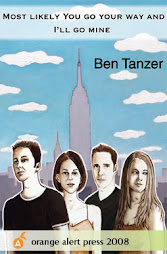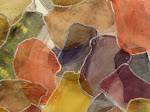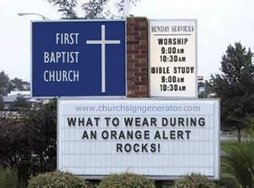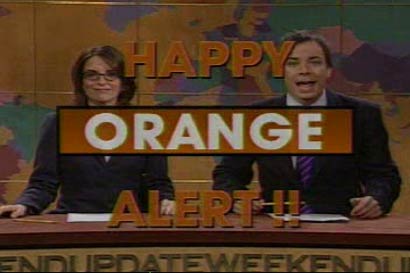 Joe Frawley
Joe FrawleyGrowing up in the '80's, when I hear the word sample I think hip hop. I picture a deejay cutting and chopping up portions of old funk records and laying down a solid beat. Or perhaps he throws in a phrase here or there, like "pump up the volume" or "fresh" and so on. So when I discovered a sampled based musician from Connecticut named Joe Frawley I was pleasantly surprised to hear subtle piano tones coating chopped and repeated audio samples. To a writer it is not a foreign concept to feel that there is rhythm and music and pattens contained in the spoken word. Most musicians prefer to utilize words that have been sung, but when sampled the spoken word can have a more mysterious and luring tone and texture. Last summer, Joe released his first full-length album, A Book of Dreams on his own label. On the album he defines the line between music and sound art while creating a world as beautiful as it is frightening.
His latest release, Ritual Research, was released last month for free through the on-line label Clinical Archives. It follows a daydreaming graduate student who slips obliquely into a subconscious underworld of shifting identities. The listener moves through the dreams as if on a cloud moving with each piano note. It is a fascinating collection that has been downloaded over 22,000 times in the last month, and for good reason.
Recently, Joe was kind enough to answer a few of my questions.
Orange Alert (OA): Let's start with the idea of sampling. I have interviewed a few other sample based artists, and they basically operate on faith. As Jon Nelson of Escape Mechanism put it, "faith that our country's legal system would choose to defend the creative act, over the micro management of every single sound byte ever recorded". Where do you find the majority of your samples and do you ever feel the need to get clearance to use them?
Joe Frawley (JF): To answer the first part, my samples come directly from my listening experience. I am kind of an audio junkie, equal parts music and spoken word. Public radio interviews, even some dialog from films go in. Certain phrases, whether musical or spoken, will just resonate with me and I’ll have to rip them. Most interesting for me is when I can recombine them with other sounds to create an entirely new context. The old man’s voice in “The Hypnotist” is from a VHS tape of Leonard Bernstein rehearsing “Le Sacre du Printemps”. Sometimes the original source is something kind of weak, or not very evocative in its original context. For example, I have ripped dozens of audio samples from a DVD of Charlotte Church live in Wales, including between-song banter. I rip a lot of audio from public radio interviews. An interview with A.S. Byatt features strongly on my composition, “Tangerine”. I also have a pretty good field recorder, and some of Ritual Research is based on a surreptitiously recorded conversation I had with an individual. As far as legal clearance goes, I have a few thoughts on this: 1. The work would never get made if I did everything legally. 2. In this country, lawsuits aren’t based on principle, they are based on money- of which I make none. (That’s not to say I don’t sell records, but I just about break even). 3. My samples are intentionally obscure, which greatly lessens any economic damage. Negativland sampled U2, I think, to be intentionally provocative. My samples are meant to slip through your fingers, so to speak. One last point, being a musician I do take care to give credit to the musical appropriations from other composers.
OA: Speaking of Jon Nelson, I first heard your music on his program Some Assembly Required. How do you handle promotion of your music, and do you feel there is an adequate forum for your brand of classical/electronic music?
JF: I have my own label, Joe Frawley Music, and promotion is hard work, almost equal to the creative process. My work intentionally hovers in the cracks between music and sound art. It fits in between several different genres, which makes audience targeting a challenge. I have the most success with outlets that attract fans of experimental, ambient and post-rock music. I’m hoping the future will bring about a genre where my work will be at home, maybe called “Mind Music” or “Dream Soundtracks” or something like that.
OA: There are two distinct elements at play in your music, the classical nature of your piano play and the electronic and complex nature of your sampled speech and field recordings. How is a song typically built? Do you create a melody on the piano and build upon it or do you find a spoken phrase or vintage recording and create a soundtrack for it or does it all just come together at once?
JF: I usually have an archive of piano recordings, which might be stuff I composed, or improvisations. I usually treat these recordings the same way I do the other sound samples I collect. I might use a loop of a piano phrase and combine it with some voice or sound effect and see if it evokes any feeling. The process is remarkably similar to painting, or the way I imagine painting would be since I don’t paint. You can actually hear the audio equivalent of underpainting or palimpsest, where ideas that didn’t take were faded to the background, while a stronger idea was “painted” on top of it later. Some pieces are clearly based around a piano recording, like “The City (Map 2)”, while in others, the samples are more prominent. I try to think like a composer and avoid ear fatigue with any one tone or texture. Regarding structure, I don’t usually plan things out. I’ve read there are two different types of authors, those who outline the plot first, and those who discover the story as they write it. I would fall artistically in the camp of the latter, when working with sound collage.
OA: Your latest release, "Ritual Research", was released last month for free through Clinical Archives. How was this decision made to give this beautifully intense ep away for free?
JF: Thanks for the kind words. My friend Alex who curates that net label invited me to submit a release just as I was finishing Ritual Research. At first I said ‘no, thank you’, because I really dislike how my music sounds on MP3s. It’s just not the best presentation for my work. Then I realized his releases get upwards of 20,000 downloads, which is probably more listeners then all my previous CDs combined. I am also still selling “A Book of Dreams” which has only been out for 6 months, so I began to think of the net-label release as a promotional tool for my back catalog. We’ll see if it works. This is a strange time for music making. I’d love to see vinyl become king again, but it not going to happen. I don’t complain though, because if this were 15 years ago, I’d just be some weird guy making sounds in his basement and no one would ever hear it. So you take the good with the bad.
OA: I have really enjoyed the added element of video to a few of your songs, it really helps to visualize the intended or indirect or statement of the piece. Do you see video playing a larger role in your future projects? What motivated you to get into video collage?
JF: My first video was basically a slide show of some of my original photography- photographs of some artwork I had made, mixed with pictures of my wife, Michelle- set to the audio piece “Wilhelmina’s Dream”. I did it to feature my visual art, but then got intrigued by the idea of treating video clips the same way I treat audio: looping, processing, mixing to create new meanings out of pre-existing images. I’m currently experimenting with some new video ideas. My music is intended to evoke visual/mental imagery, so I feel a little uncomfortable imposing video images on my audio pieces. I hope to find a balance. The thing I like about video is that I have no idea what I’m doing. At least with sound collage, I had a music background. Video is terra incognita, which is exciting.
OA: What's next for Joe Frawley?
JF: I am really interested in pursuing collaborations with other artists, and not necessarily those who sound like me or share my aesthetic. I hope to continue exploring new directions within the same style and to avoid repeating myself. Increasing family and professional demands are making it more and more difficult to find space to create; but with luck, in a year I will have another 30 minutes of new music. That’s about the going rate.
Bonus Questions:
OA: Coffee? If yes, where can you find the best cup in your area?
JF: Tea. My house. Da Hong Pao (oolong). Order from Harney & Sons.
OA: What was the last great book you have read?
JF: Repetition by Alain Robbe-Grillet. Not for everyone.
For more information on Joe Frawley please visit his website.
+by+Nick+Volkert).jpg)





















No comments:
Post a Comment